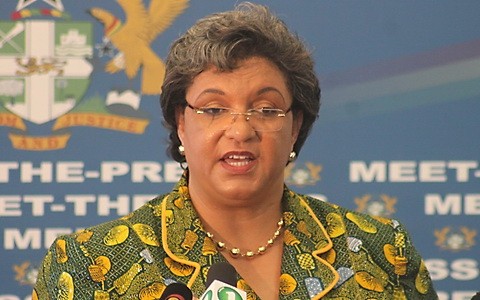Hanna Tetteh Questions if Public Opinion Influences Supreme Court Decisions
Former Minister Explores the Judiciary's Role Amidst Political Tensions in Ghana

- Hannah Tetteh examines whether the Supreme Court considers public opinion when making rulings
- She emphasizes the importance of a strong judiciary for maintaining peace and democracy
- The Supreme Court's stay on Speaker Bagbin’s declaration of vacant seats highlights the delicate balance of power in Parliament
Hanna Tetteh, Ghana’s former Minister of Foreign Affairs, is probing a crucial issue: how much does public opinion influence the Supreme Court’s rulings?
In a recent Facebook post, she examined whether the highest court considers societal sentiments in its judgments, particularly in politically charged cases like the recent ex-parte ruling concerning Parliament Speaker Alban Bagbin’s decision on vacant seats.
Hanna Tetteh emphasized the judiciary’s vital role in applying the law impartially. However, she argues that judges operate within a broader societal context that includes not only the litigants and legal community but also businesses, religious groups, unions, civil society, and the general public. She questions, “Do they listen to public commentary and consider the implications of their decisions and how society reacts?”
With Ghana entering another election cycle and the political landscape growing increasingly tense, Tetteh believes the judiciary’s role becomes even more critical. The Court’s decisions can significantly impact the balance of power and stability in the nation.
While she asserts that the judiciary must remain independent, she cautions that the consequences of their decisions extend far beyond the courtroom. “In these fragile times, we need a judiciary that understands its pivotal role in ensuring that democracy not only survives but thrives,” she concluded.
Hanna Tetteh’s post comes on the heels of the Supreme Court’s recent unanimous ruling on October 18, 2024, which stayed the execution of Speaker Bagbin’s declaration of four parliamentary seats as vacant.
This ruling, following claims by MPs aiming to run as independents, keeps the current balance in Parliament intact until further proceedings, stirring debate on whether the judiciary is overstepping its bounds and undermining parliamentary authority.
Below is the full post
When the Justices of the Supreme Court take their decisions, or make orders in whatever circumstances, not just in the context of the recent ex-parte decision against the Speaker’s ruling, do they listen to the public commentary and reflect on their decision, its implications and how it has been received not only by the parties to the particular suit or in a case with political undertones the legal profession, the businesses/investor community, the diplomatic community, religious actors, the unions, civil society and other key social actors?.
Of course they are expected to interpret the law and ensure its application without fear of favour but they do so within the context of the society that the laws govern.
We live in hyper-partisan times, and the closer we get to elections the more tense the political environment, and consequently the times when peace and security within the state is at its most fragile.
A strong, principled judiciary is essential to a competitive but peaceful democracy. They have an important role to play in ensuring this democracy not only survives, but thrives.





